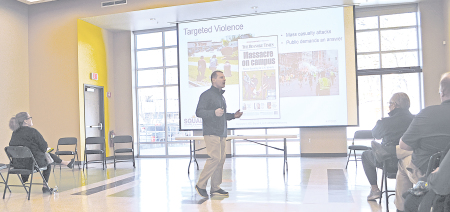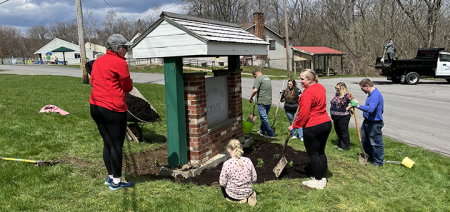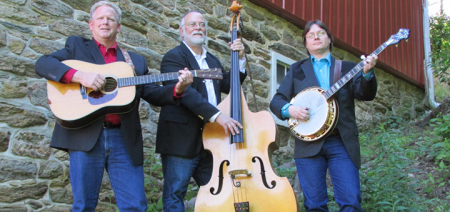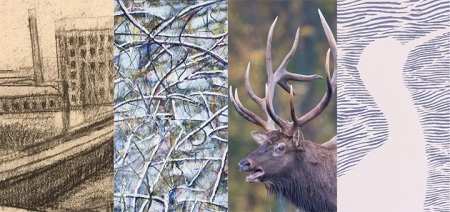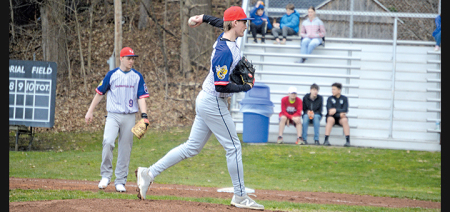Summer Vacation: A Trip To Italy
Published:
November 6th, 2006

The Phone Call
EDITOR’S NOTE: Inspired by Bryan Snyder’s summer series chronicling his outdoor adventures, Mary Musson of Norwich has presented us with this five-part series detailing her summer’s journey to Italy. If you have a “summer vacation” story you’d like to share, e-mail us at news@evesun.com.
By Mary Musson
Correspondent
It was three in the afternoon on a cold winter day in Chenango County. I had not slept much the night before, a common recurrence these days as mother’s illness was in its last stages and she was often restless at night, sometimes getting out of bed and pacing around the house with her noisy walker. My husband Ron had left the week before to take a consultant job on Long Island where his 30-year background as a school business administrator made him a very sought after interim superintendent during his retirement years. I had not wanted him to go and feared his driving winter roads on his return to Norwich every weekend, but I knew the end was near for my mother. He had been so supportive during her six years of illness, that I thought he really needed the distraction of work. Of course, I needed a distraction too, but as the only child to a widowed mother there was no escape for me and, though I rarely play the martyr, I was feeling really down. And then the call came.
“Pronto ... pronto, chi parla ... Mariangela, sei tu?”
I didn’t quite recognize the voice, but I knew the caller was a family member. Only my family calls me by my given name, a combination of my paternal grandmother Maria and my maternal grandmother Angela. How I love the sound of my name in Italian – in Spanish, too, which is my native tongue since I was born in Argentina. When I was eight years old, my family moved to the United States from a gorgeous suburban house in the picturesque neighborhood of Quilmes, just a half hour from Buenos Aires, to an apartment in Jersey City. Among the many changes I encountered at that time was the transformation of my beautiful name by the flat and nasal ‘a’ of a New Jersey accent. I quickly dropped the “Angela” and went by my present name, Mary A. Musson.
“Chi parla?” I asked.
And soon my cousin Angela from Taranto, Italy was speaking in machine gun Italian and I listened smiling, remembering that the woman hardly ever took a breath when she spoke. It always amazes me that no matter how many years pass without my speaking Italian, the minute I am in the company of my family and friends from that country, it quickly returns like some long-lost friend. She asks me three or four very quick questions and hardly waits for my answers, as she asks three or four more. I pause and take the reins of the conversation in hand and in a strong and steady voice I answer her. “Yes, I am doing just fine,” I lie. “Mother is comfortable but very weak,” I say. “Yes, I have lots of help,” I lie, but I quickly mention the nurse that comes in to bathe her and the presence of Hospice in my home, which, although helpful, still leaves me alone for many long hours a day to care for a very sick human being. “No, my children do not come often since they don’t live near and they are busy with their lives, but they call often,” I say, not wanting to taint them.
Then she takes a long breath and she says the one thing that starts my journey back to Italy: “Mariangela, during the years you have been married and living your American life with your American husband and children in your little town in the forest (my family’s depiction of life in upstate New York) you have forgotten that you have people who love you ... but we, your family in Italy, have never, ever forgotten you. We are with you in our thoughts and prayers ... even though you are now Protestant and I am not sure what you make of our prayers and saints and the Pope and such ... but, we are with you and we love you and I beg you to consider when this weight you are bearing is over ... come home to Italy and letting us nurture you.”
When mother died a few weeks later, more calls came from overseas. Mother’s family called from their outposts in Rome, Salerno, Potenza, Taranto and of course, Molfetta, our hometown. Dad’s family called too, from New Jersey, Florida, New York, Milano and Molfetta, too, and I thought to myself, yes, it would be nice to see family; maybe I’ll go someday. Then the second important call came, this one from my cousin Tonio, the funniest person I know.
When I was a teenager and went to Italy for the first time, my Zia Pina’s (mom’s only surviving sister) sons were like brothers to me and I spent a great deal of time with them. I returned to Italy many summers between high school and grad school and usually stayed in her home. I was there when her eldest son Pino, dynamic and energetic, married Anna, and when her second son, the gentle and kind Rino, married Maria. But, when I think of Italy and side-splitting laughter, it is always Tonio who comes to mind. He and I are the same age and have the same outgoing personality and sense of humor. He and his gorgeous wife, Ottaviana, are middle school teachers in Molfetta. She teaches English and he teaches technology and it took much patience and many sacrifices for them to get these posts in their hometown because jobs in southern Italy are hard to come by. For many years they taught up north and even taught in different cities for a while in order to puff their resumes in an attempt to come back home, and about ten years ago they succeeded and now live happily in a sleek modern condo with their beautiful daughter Michela.
Hearing his voice over the phone put a huge smile on my face as I remembered some of our escapades of summers past. We started reminiscing at once and recounted tales of my stepping on a sea urchin after our regular morning swim and screaming in pain so loud he claims they heard me in the next town. He reminded me of the way the local boys flirted with me and made fun of a feathered hat I wore which they said made me look like I had a chicken on my head. Then I mentioned the field behind the football stadium and his loud laughter crackled through the intercontinental phone line. Soon we were reliving the moment and interrupting each other as we fit the memories together.
For years Aunt Pina’s boys had taken me all over Molfetta during my summer visits there like a pet poodle, introducing me with pride to their friends and showing me the good, the bad and the risqué aspects of Italian life. One night when I was about 18, I asked them to take me to lover’s lane – a field behind the soccer stadium in town. I remember sitting in the back of Pino’s car, smoking French cigarettes and looking around at all the small little Fiats which were bobbing about to the rhythm of young love. At one point, one of the cars bounced around so much it moved close to the edge of a small crater in the middle of field and when it fell in, the crowd roared with laughter, applause and shouts of “Bravo!” and started beeping their horns and turning on their high beams to help the young and assuredly embarrassed couple out of the hole in the ground. It was memorable. In fact, I wrote about it in my first novel, “Ideal Woman,” where the heroine spends summers in a small town in Italy.
As we resumed our phone conversation, he casually asked, “So when are you coming to Italy?” and I found myself answering, “Next summer,” and so began my journey back to Italy after an absence of more than 20 years. I thought about it for several months and put off telling my husband until one month before I left. I wasn’t sure of his reaction because I was going to ask him to let me go alone; I couldn’t go back to Italy with Ron – it would make the trip a hardship. For one thing, he doesn’t speak the language, for another he doesn’t know the local customs which include lots of visiting of relatives in their homes and answering the same questions over and over again, not to mention the discomfort of the heat and humidity and traffic noise that is part of living in Molfetta. When I finally brought up the subject, just four weeks before leaving, he was a real sweetheart about it, good and generous to the core and he encouraged me to go because as he said it, “You deserve it ... you worked hard taking care of your mother, and me and the kids all these years ... go, have a good time, just miss me a little, OK?” No wonder we’ve been married over 30 years.
And so, I began my Internet search for the best travel arrangements and after checking my schedule which included some garden club responsibilities (I’m president of the Norwich Garden Club this year) at the New York State Fair, I decided I would go to Italy for the whole month of September. It would not only be a vacation and a chance to reconnect with my family, but also a time to research the book that has been swimming in my head for many years, a book about the life of immigrant children in this country. This would be a new type of book for me because unlike the writing I had done professionally for years which included newspaper articles, press releases, annual reports, brochures and manuals and one book of fiction, this one would be autobiographical and very painful to write. This would be my story, and my parent’s story and the story of everyone who comes to the United States with hopes and dreams and pretty pictures in their heads about life in America only to hit up against the truth of the matter: hard work, isolation and the nerve-tingling fear of losing their children to a culture they barely understand which will, in the end, steal them away forever. The time had come for me to pour it all out on paper, as one writer put it, “To slice my wrists and write each word with drops of blood.”
As I finalized my plans to leave for Italy, I found myself methodically waking up at four o’clock every morning. I recognized this mystical call immediately. For years I had attended a writer’s workshop during the summer at Skidmore College where one night sitting around a dorm lounge, I asked the other writers present if they had experienced the four o’clock wake up call while working on an intense writing project and a light seemed to go on around the room as we began to discuss this phenomena.
“Yes, of course,” one of the wise older sages in the room told us, “It’s the hour when the muses come near and start whispering in our ears with ideas that start the creative flow.”
Well, they had arrived and they were coming to Italy with me. This would be more than a vacation and a time to reconnect with family, I had a gut feeling that this would be one of the most important times of my life creatively and I knew I had to not only enjoy myself, laugh a lot and cry a bit, but I also had to pay attention and take lots of notes. Something great was about to happen and I hoped I wouldn’t disappoint the angels that were traveling with me.
Part II of this five-part series will appear in Tuesday’s Evening Sun.
Comments
